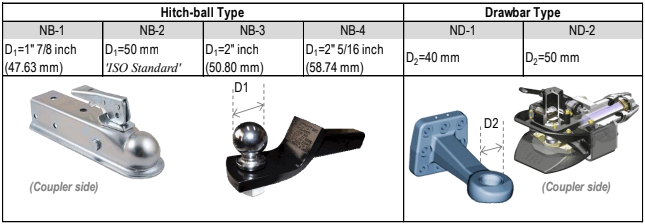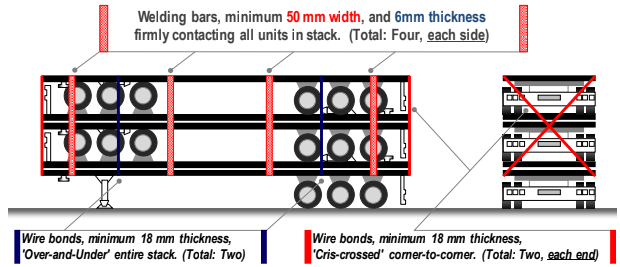RoRo Shipping of Trailers & Towable Cargo
Request a Quote
Roll On Roll Off Shipping of Trailers & Towable Cargo
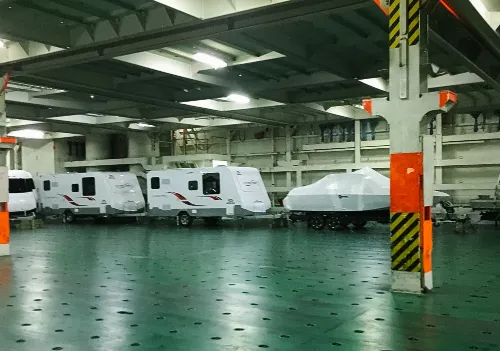
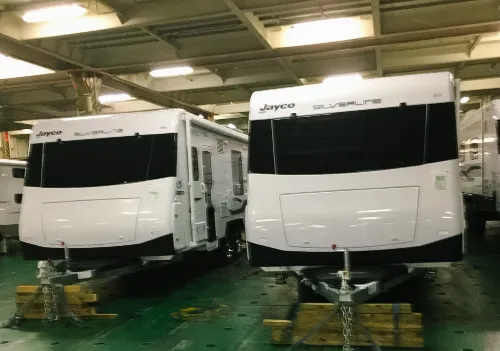
RoRo shipping of trailers and towable equipment is the most efficient and cost effective way to transport this type of cargo.
Towable cargo is loaded and discharged via the ship’s ramps and safely stowed below deck and all main types of hitches commonly used on trailers can be used for loading and unloading on car carrying ships.
Depth RoRo routinely ships mobile industrial plants and equipment via roll on roll off ships.
These include:
- Caravans
- Fifth Wheelers
- Semi Trailers
- Asphalt plants
- Power generation plants
- Drill rigs
- Lighting towers
- Gas compressors
- Elevating work platforms
- Concrete batching plants
- Water treatment & pumping plants
- Plant trailers
- Car trailers
- Mobile crushing & screening plants
RoRo transport of towable cargo is by far the most efficient way to ship it anywhere in the world.
Preparing Towable Cargo for RoRo Shipping
To facilitate loading and discharge operations of towable RoRo cargo, Depth RoRo needs to be advised in advance of the type of hitch/connector fitted to the cargo.
For semi-trailers most carriers can accept a standard king-pin of 2″ (Diameter: 50.80 mm).
For other trailers the hitch types detailed below can be accepted.
Trailer legs/jockey wheels must be in good condition and capable of withstanding the rigors of ocean transportation. The safe operating weight of the trailer must not be exceeded and cargo must not be loaded onto trailers without prior approval. Park brakes must be functioning.
Trailers fitted with steerable axles and/or independent suspension multi-axle trailers must have operating instructions supplied and affixed to the trailer. Some special trailers with steerable axles may require the shipper to provide ‘expert drivers’ at the port of loading, transhipment and destination.
Tank trailers that are used must have a certificate evidencing they have been de-fueled or de-gassed.
Used semi-trailer stacks must be secured by welding. A maximum of five trailers is permissible in a single stack and at least 4 substantial metal bars are to be welded to every trailer on each side of the trailer stack with additional lashings taken as shown in the diagram.
All tyres should be inflated to the manufacturer’s recommended operating pressure. Any cargo with flat or cut tyres will be refused by the carriers.
Any oil leaks must be fixed before delivery of the cargo for shipment. Carriers can reject cargo with leaks on safety and environmental grounds. If leaks occur during transit, carriers can charge cleaning fees for the vessel and terminal.
Piggyback cargo is defined as any unit which has supplementary or retrofitted cargo loaded onto it. Depth RoRo must be consulted at the time of quoting and booking as some carriers refuse to accept this type of cargo. If accepted by carriers there are limitations that the piggyback cargo is securely loaded onto a trailer or vehicle designed for that purpose. Dismantled side panels or spoilers can be accepted providing these are suitably secured. Any cargo piggybacked must be declared and noted on the bill of lading.
Trailers must not be loaded with other internal cargo unless properly declared at the time of booking. Not all carriers accept trailers loaded with internal cargo so Depth RoRo may need to seek acceptance before confirming a booking. If accepted then any cargo stowed inside the trailer must be securely restrained so as to endure the rigors of ocean transport.
Cargo missing fuel and oil caps can be rejected by carriers.
All items in or on the cargo should be properly secured so they cannot move and potentially cause damage during transportation.
Some countries have stringent Quarantine Regulations so trailers and towable cargo must be delivered for shipment in a very clean condition. These regulations can include re-export of your cargo at your expense. Brown Marmorated Stink Bug is another significant quarantine risk that must be dealt with prior to shipment of RoRo cargo during the season.
Freight is calculated on the overall dimensions of the cargo. To keep your freight costs to a minimum, it is important to reduce the dimensions where possible. As long as it doesn’t impact the safe and reliable operation of the cargo, parts or accessories such as radio aerials, beacon lights, exhaust stacks, or any other protrusions should be removed, cylinders retracted, and mirrors turned in. This is a non exhaustive list and are examples of what you need to consider when presenting your cargo for shipment.
We strongly recommend that you take out marine insurance on your cargo in the event of any mishap during transportation. We can quote you on this aspect on request if you can provide us with the value of the cargo. It is important to note that most underwriters require a condition report prior to shipping in the unfortunate event of a claim.
If these cargo preparation guidelines are not followed then short shipment and extra expenses can be incurred to your account.
